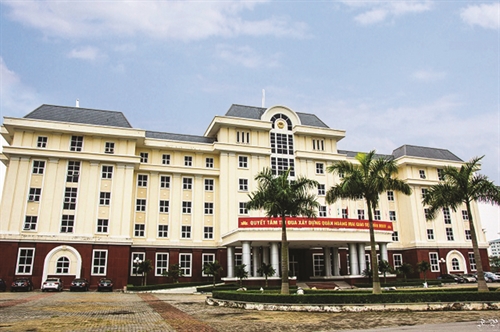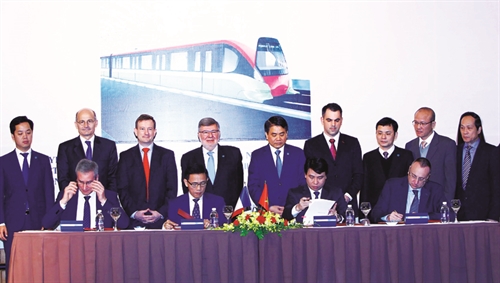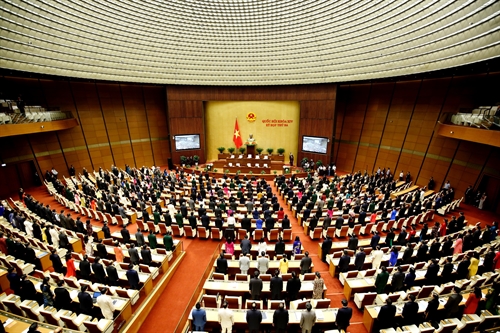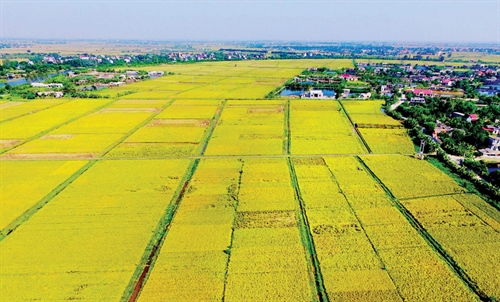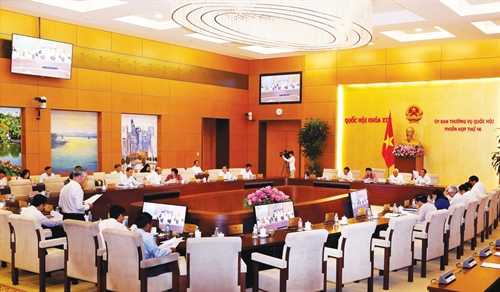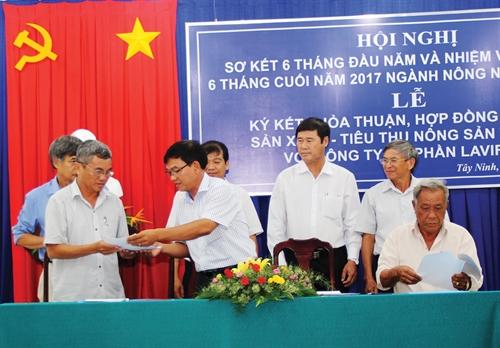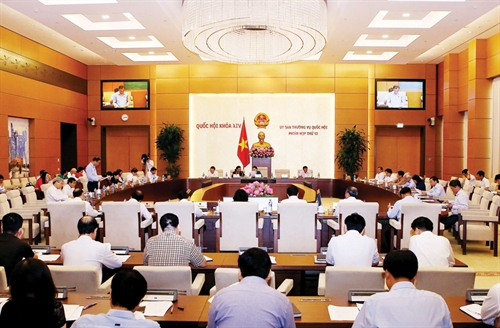The National Assembly (NA) passed six laws that would influence national development in different fields, said NA Chairwoman Nguyen Thi Kim Ngan at the closing meeting of the NA’s fourth session that concluded on November 24 after 26 working days.
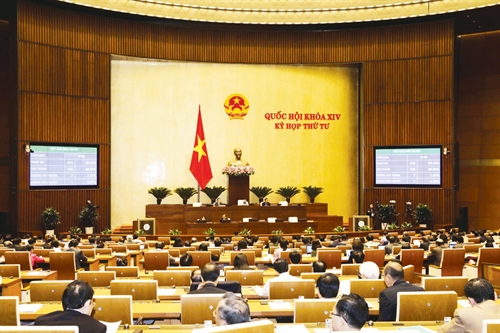 |
| National Assembly deputies vote to pass the revised Law on Credit Institutions on November 24__Photo: Phuong Hoa/VNA |
The adopted laws include the Forestry Law; Planning Law; and amendments to the Law on Credit Institutions, Law on Fisheries, Law on Public Debt Management, and Law on Overseas Representative Missions of Vietnam.
Lawmakers also debated and resolved on socio-economic development and state budget; special mechanisms and policies for Ho Chi Minh City; reforming general education curricula and textbooks; investment to build the north-south route during 2017-20; and land recovery and compensation for building the Long Thanh international airport.
State to issue investment policies on forestry activities
Arranged in 12 chapters with 108 articles, the Forestry Law (replacing the Law on Forest Protection and Development) focuses on the management, protection, development and use of forests.
The law regulates for the first time the processing and trade of forest products.
The law says that the State will issue policies to invest in and mobilize social resources for forestry activities.
It will organize and support the management, protection and development of commercial forests, while supporting forest recovery, afforestation, research and application of modern science and technology in the field of forestry.
The State will be also responsible for training human resources for this sector, providing forest environmental services, managing forests sustainably, processing and trading forest products, and implementing forestry cooperation with foreign partners.
The State will also enable ethnic people and people who live on forests to use forests and forest land for agro-forestry, aquatic production and practice forest-linked cultural activities under the Government’s regulations.
Meanwhile, the Planning Law, which will take effect in early 2019, establishes a new system of national master plans and fundamental principles for planning work. It also defines tasks and powers of state authorities in planning activities and regulates the formulation, implementation and supervision of master plans.
The system comprises national master plans, regional master plans, provincial master plans, special administrative-economic zone master plans, and urban and rural master plans. National master plans serve as the basis for formulating lower-level master plans.
The law stipulates that an agency empowered to decide on and approve a certain master plan has the right to adjust it without having to seek the nod from higher-level planners.
A noteworthy point is that airspace and underground master plans are not included in the national planning system as suggested by some NA deputies. Explaining this, Chairman of the NA’s Committee on Economic Affairs Vu Hong Thanh said the planning of airspace and underground space was already incorporated in other kinds of planning in the system and did not require separate mention.
According to the amended Law on Public Debt Management, set to come into effect next July, numerous control mechanisms and legal frameworks are added to improve the country’s financial sustainability and macroeconomic stability.
Under the law, the State will perform the unified management of public debts and oversee the performance of responsibilities and exercise of powers by agencies, organizations and individuals involved in public debt management.
The State will also closely control public debt safety criteria for a safe and sustainable national financial system and macroeconomic stability.
Regarding NA deputies’ concerns about the relationship between the public debt level and debts incurred by state-owned enterprises (SOEs), the NA’s Standing Committee affirmed that SOEs are responsible for repayment of their own debts and their debts will not be classified as public debts.
In the event that SOEs are unable to meet their financial obligations, they can proceed to declare bankruptcy just like any other businesses.
HCM City autonomy
The Resolution on pilot implementation of special mechanisms and policies for development of Ho Chi Minh City grants greater autonomy to city authorities in land management, investment, finance and state budget management, as well as incomes of cadres and civil servants under the city’s management.
For example, the municipal People’s Council is allowed to impose certain charges and fees not on the list of those regulated by the Government, or raise charges and fees that have been decided by competent authorities.
The council can ask the Government to submit to the National Assembly Standing Committee for approval the proposals to increase taxes or tax rates for some products regulated by the Government.
The city can use 100 percent of additional budget revenues earned from these policy adjustments and 50 percent of earnings from selling state property and land-attached assets to invest in socio-economic infrastructure.
The city will also enjoy revenues from privatizing SOEs under its management and divestment of state capital from economic entities in which the municipal People’s Committee acts as representative of the state owner.
The resolution will take effect on January 15, 2018, and be effective for five years.
Question-and-answer session
Responding to questions over the wealth disparity, including social stratification between rural and urban areas and mountainous and delta areas, Prime Minister Nguyen Xuan Phuc admitted that despite the Government’s efforts and recent achievements, there remained big development gaps between these areas, with rural income just half of that in urban areas, and even lower in mountainous areas.
“A reasonable distribution of wealth is an ongoing priority,” and will be promoted in the coming time via economic restructuring, improving labor productivity and product quality, creating more jobs for people in remote areas, redistribution of income by taxation, and better social security, Phuc said.
On promoting the private sector’s role in the economy, the PM said the country can expect to have more than 115,000 new private companies this year with 93 percent of them operating well.
He also reiterated the Government’s commitment to improving the business environment, increasing transparency and equality in accessing resources, simplifying procedures, and preventing overlapping inspections.
Responding to concerns over the management of foreign-invested enterprises, PM Phuc said they are “part of Vietnam’s economy” that contributes 60 percent of the country’s export value and employs 3 million people.
But there remained problems, such as the level of technology used, pricing, tax evasion and violations of environmental regulations. These will be strictly dealt with, Phuc said, adding the Government will be choosy about attracting investment.
Investment will be directed to areas really in need, “not in just any area, and by whatever means,” he added.
He said foreign-invested and domestic firms should cooperate better for a win-win development.
The PM strongly affirmed that “the Party and the State will not allow outrageous high-profile corruption cases to fall flat,” and that the judiciary and legislative sectors will collaborate to deliver rightful results to the public.
Some NA deputies expressed their appreciation for the Government’s recent strong anti-corruption push, but also voiced concerns over “new and more sophisticated and deep-lying forms of corruption” that can undermine the political system.
The PM said the Government is collecting and integrating NA feedback on its amended Law on Anti-Corruption, in the spirit of “there must not and should not be corruption.”
He also asked the NA to consider raising wages for civil servants as a way to ensure their livelihood and reduce petty corruption.
“The application of information technology solutions can be helpful in preventing corruption,” he said, asking local governments to promote this process in the coming time, together with the implementation of e-government.
Taking the floor to answer lawmakers’ queries, Chief Justice of the Supreme People’s Court Nguyen Hoa Binh stressed the need to comply with provisions of the new Criminal Procedure Code throughout the three stages of investigation, prosecution and trial.
The Supreme People’s Court has issued standard procedures for establishing court precedents and planned to create a national advisory council for court precedents, he said. He added that in the future, this will help remove certain difficulties in the country’s court system.
“We will apply not only the court precedents of Vietnam but also those of the world,” he noted.- (VLLF)

